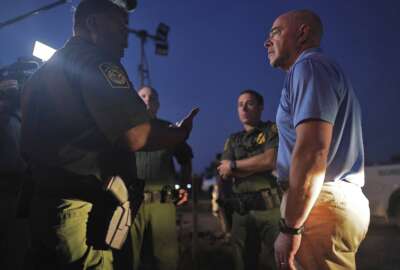
Air Force team heads to Guam to offer post-typhoon assistance
In today's Federal Newscast: Border Patrol Chief Raul Ortiz will end his 30-year career in 30 days. An Air Force disaster recovery response team is on its way to...
- The Border Patrol’s top official has decided it is time to retire. And it is not the first time Raul Ortiz has tried to hang up his hat. He first submitted his retirement paperwork two years ago, after more than 30 years as a Border Patrol agent. But Homeland Security Secretary Alejandro Mayorkas persuaded Ortiz to stick around for a while longer as the Chief of the Border Patrol. DHS has yet to say who will replace Ortiz. His last day on the job will be June 30.
- Lawmakers are pressing the White House to fill a key cyber position. It has been more than three months since former National Cyber Director Chris Inglis stepped down. Calls are now growing for President Biden to nominate acting national cyber director Kemba Walden to serve as the permanent director. In a letter to the president last week, House Homeland Security Ranking Member Bennie Thompson (D-Miss.), and dozens of his colleagues, urged Biden to pick Walden for the role. And earlier this month, leaders of the Cyberspace Solarium Commission also urged Biden to nominate Walden. Prior to her role at the White House, Walden had served in both the public and private sectors, including as an attorney at the Cybersecurity and Infrastructure Security Agency and as assistant general counsel in Microsoft’s Digital Crimes Unit. (House Homeland Security Dems call on Biden to nominate Walden for national cyber director - Rep. Bennie Thompson (D-Miss.))
- The Department of Veterans Affairs is relaxing masking requirements at its medical facilities. The VA said its facilities will no longer universally require masks in most clinical areas. VA employees, veterans and visitors will still need to mask-up in high-risk areas such as patients receiving transplants, dialysis and chemotherapy. The VA will also require masks for individuals with a suspected or confirmed COVID-19 infection or other viral respiratory infection. Veterans who are patients, or their family members, may also request VA medical personnel to wear a mask when providing care to that patient. (VA relaxes masking at health care facilities - VA News)
- Chief human capital officers may get a little more say in upcoming workforce policies. Personnel office hours with the Office of Personnel Management aim to let the agency human capital leaders offer feedback earlier for policy changes. The office hours have already let CHCOs give input on OPM's proposals for a 10-year term appointment and paid-internship guidance, to name a few. OPM said feedback about the office hours was positive from both ends. The agency plans to continue regularly scheduling time to get feedback from CHCOs throughout 2023.(The CHCO Council’s role is growing, but major recruitment and retention challenges remain - Federal News Network)
- The Air Force is ready to expand its Cloud One capabilities, as it kicks off its research for the cloud services and application development tools for the next version of its Cloud One platform, called Cloud One Next. The service released three requests for information earlier this month, seeking industry feedback on an assortment of capabilities. One RFI is asking for expertise in application and data modernization and migration into commercial clouds. Another one is focused on resellers providing cloud services. And the third RFI is asking for expertise in providing managed services to takeover, expand, operate and continuously improve Cloud One. The Air Force will hold industry days for reach of the RFIs in early June. Responses are due by mid-June.(Air Force RFIs for Cloud One Next - sam.gov)
- An Air Force disaster recovery response team will make its way to Guam to assess damage in the wake of Category Four Typhoon Mawar, which damaged infrastructure on the island last week. The Air Force team works to recover and rebuild after natural disasters. They also provide strategic construction management to help installations recover from disasters and help make the infrastructure more resilient. The typhoon's 140-mile-an-hour winds knocked out utilities and damaged buildings.
- The Defense Department's new health record-keeping system is causing recruiting delays for the Air National Guard. It is called "MHS Genesis" and it manages the comprehensive records on the health history of service members. Air National Guard director Lt. Gen. Michael Loh said the record-keeping system means it takes 30 to 60 days longer to process new recruits. He said his service is still recovering from the challenges of trying to recruit during the COVID pandemic, and now it takes about 90 days to get a new recruit through all the necessary screenings.
- The American Federation of Government Employees is reiterating that federal employees working remotely should maintain their union eligibility. The challenge recently arose for some employees at the Environmental Protection Agency. Due to an upcoming change in duty station, membership eligibility came into question for a handful of remote workers across multiple EPA facilities. AFGE and EPA management agreed to postpone the employees' pending removal from the bargaining unit and instead schedule a union election. The affected bargaining unit members earlier this month voted to keep their union membership status with AFGE.(AFGE wins union election at EPA facility in Michigan - American Federation of Government Employees)
- The Government Accountability Office swated away a contractor's challenge over a multibillion-dollar intelligence deal. Booz Allen Hamilton had protested the National Security Agency’s decision to award a potential five-year contract for network and exploitation analyst services to CACI. Booz Allen alleged that the NSA misevaluated the proposals and made an unreasonable source selection. But GAO denied those arguments, finding no basis to question the agency’s decision. GAO documents showed that CACI’s cost estimate of $2.4 billion came in well below Booz Allen’s $2.7 billion probable cost figure.(GAO denies Booz Allen Hamilton protest of NSA contract - Government Accountability Office )
- The Office of Management and Budget is planning to launch a series of pilot programs starting this summer around creating a federal program inventory. OMB said the pilot will lead to full implementation by 2025. The Digital Accountability and Transparency Act and the Program Management Improvement Accountability Act both direct OMB to require agencies to create a federal program inventory that provides complete, comparable and useful information, as well as better integrate related statutory requirements. The pilot is one of a handful of efforts by OMB to close 44 open-priority recommendations by the Government Accountability Office. GAO has been releasing updates to every agency's open-priority recommendations over the last few weeks.
- The State Department is outlining its vision for international relations in outer space. The department is releasing its first-ever Strategic Framework for Space Diplomacy. The document focuses on establishing international cooperation in mutually beneficial space activities and setting commitments from other countries not to launch anti-satellite missile tests. The strategy also focuses in part on empowering the State Department workforce to better understand policy matters that impact space diplomacy.
(United States leads in space with diplomacy - State Department)
Copyright © 2025 Federal News Network. All rights reserved. This website is not intended for users located within the European Economic Area.
Peter Musurlian
Peter Musurlian is a producer at Federal News Network.
Follow @PMusurlianWFED




